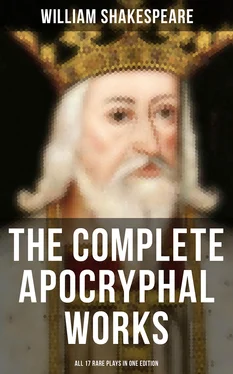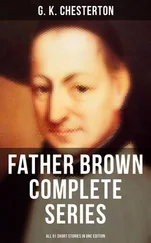And well would seem to make a vestal Nun.
How finely frames she her oration!
THRASIMACHUS.
Locrine, we came not here to fight with words,
Words that can never win the victory;
But for you are so merry in your frumps,
Unsheath your swords, and try it out by force,
That we may see who hath the better hand.
LOCRINE.
Thinkst thou to dare me, bold Thrasimachus?
Thinkst thou to fear me with thy taunting braves,
Or do we seem too weak to cope with thee?
Soon shall I shew thee my fine cutting blade,
And with my sword, the messenger of death,
Seal thee an acquitance for thy bold attempts.
[Exeunt.]
[Sound the alarm. Enter Locrine, Assarachus, and a soldier at one door; Gwendoline, Thrasimachus, at an other; Locrine and his followers driven back. Then let Locrine & Estrild enter again in a maze.]
LOCRINE.
O fair Estrild, we have lost the field;
Thrasimachus hath won the victory,
And we are left to be a laughing stock,
Scoft at by those that are our enemies.
Ten thousand soldiers, armed with sword & shield,
prevail against an hundreth thousand men;
Thrasimachus, incensed with fuming ire,
Rageth amongst the faintheart soldiers,
Like to grim Mars, when covered with his targe
He fought with Diomedes in the field,
Close by the banks of silver Simois.
[Sound the alarm.]
O lovely Estrild, now the chase begins;
Ne’er shall we see the stately Troynouant,
Mounted on the coursers garnished all with pearls;
Nor shall we view the fair Concordia,
Unless as captives we be thither brought.
Shall Locrine then be taken prisoner
By such a youngling as Thrasimachus?
Shall Gwendoline captivate my love?
Ne’er shall mine eyes behold that dismal hour;
Ne’er will I view that ruthful spectacle,
For with my sword, this sharp curtleaxe,
I’ll cut in sunder my accursed heart.
But O! you judges of the ninefold Styx,
Which with incessant torments rack the ghosts
Within the bottomless Abissus’ pits,
You gods, commanders of the heavenly spheres,
Whose will and laws irrevocable stands,
Forgive, forgive, this foul accursed sin!
Forget, O gods, this foul condemned fault!
And now, my sword, that in so many fights
[Kiss his sword.]
Hast saved the life of Brutus and his son,
End now his life that wisheth still for death;
Work now his death that wisheth still for death;
Work now his death that hateth still his life.
Farewell, fair Estrild, beauty’s paragon,
Framed in the front of forlorn miseries!
Ne’er shall mine eyes behold thy sunshine eyes,
But when we meet in the Elysian fields;
Thither I go before with hastened pace.
Farewell, vain world, and thy inticing snares!
Farewell, foul sin, and thy inticing pleasures!
And welcome, death, the end of mortal smart,
Welcome to Locrine’s overburthened heart!
[Thrust himself through with his sword.]
ESTRILD.
Break, heart, with sobs and grievous suspires!
Stream forth, you tears, from forth my watery eyes;
Help me to mourn for warlike Locrine’s death!
Pour down your tears, you watery regions,
For mighty Locrine is bereft of life!
O fickle fortune! O unstable world!
What else are all things that this globe contains,
But a confused chaos of mishaps,
Wherein, as in a glass, we plainly see,
That all our life is but a Tragedy?
Since mighty kings are subject to mishap—
Aye, mighty kings are subject to mishap!—
Since martial Locrine is bereft of life,
Shall Estrild live, then, after Locrine’s death?
Shall love of life bar her from Locrine’s sword?
O no, this sword, that hath bereft his life,
Shall now deprive me of my fleeting soul;
Strengthen these hands, O mighty Jupiter,
That I may end my woeful misery.
Locrine, I come; Locrine, I follow thee.
[Kill her self.]
[Sound the alarm. Enter Sabren.]
SABREN.
What doleful sight, what ruthful spectacle
Hath fortune offered to my hapless heart?
My father slain with such a fatal sword,
My mother murthered by a mortal wound?
What Thracian dog, what barbarous Mirmidon,
Would not relent at such a rueful case?
What fierce Achilles, what had stony flint,
Would not bemoan this mournful Tragedy?
Locrine, the map of magnanimity,
Lies slaughtered in this foul accursed cave,
Estrild, the perfect pattern of renown,
Nature’s sole wonder, in whose beauteous breasts
All heavenly grace and virtue was inshrined:
Both massacred are dead within this cave,
And with them dies fair Pallas and sweet love.
Here lies a sword, and Sabren hath a heart;
This blessed sword shall cut my cursed heart,
And bring my soul unto my parents’ ghosts,
That they that live and view our Tragedy
May mourn our case with mournful plaudities.
[Let her offer to kill her self.]
Ay me, my virgin’s hands are too too weak,
To penetrate the bulwark of my breast;
My fingers, used to tune the amorous lute,
Are not of force to hold this steely glaive.
So I am left to wail my parents’ death,
Not able for to work my proper death.
Ah, Locrine, honored for thy nobleness!
Ah, Estrild, famous for thy constancy!
Ill may they fare that wrought your mortal ends!
[Enter Gwendoline, Thrasimachus, Madan, and the soldiers.]
GWENDOLINE.
Search, soldiers, search, find Locrine and his love;
Find the proud strumpet, Humber’s concubine,
That I may change those her so pleasing looks
To pale and ignominious aspect.
Find me the issue of their cursed love,
Find me young Sabren, Locrine’s only joy,
That I may glut my mind with lukewarm blood,
Swiftly distilling from the bastard’s breast.
My father’s ghost still haunts me for revenge,
Crying, Revenge my overhastened death.
My brother’s exile and mine own divorce
Banish remorse clean from my brazen heart,
All mercy from mine adamantine breasts.
THRASIMACHUS.
Nor doth thy husband, lovely Gwendoline,
That wonted was to guide our stailess steps,
Enjoy this light; see where he murdered lies
By luckless lot and froward frowning fate;
And by him lies his lovely paramour,
Fair Estrild, gored with a dismal sword;—
And as it seems, both murdered by themselves,
Clasping each other in their feebled arms,
With loving zeal, as if for company
Their uncontented corps were yet content
To pass foul Stix in Charon’s ferry-boat.
GWENDOLINE.
And hath proud Estrild then prevented me?
Hath she escaped Gwendoline’s wrath
Violently, by cutting off her life?
Would God she had the monstrous Hydra’s lives,
That every hour she might have died a death
Worse than the swing of old Ixion’s wheel;
And every hour revive to die again,
As Titius, bound to housles Caucason,
Doth feed the substance of his own mishap,
And every day for want of food doth die,
And every night doth live, again to die.
But stay! methinks I hear some fainting voice,
Mournfully weeping for their luckless death.
SABREN.
You mountain nymphs, which in these deserts reign,
Cease off your hasty chase of savage beasts;
Prepare to see a heart oppressed with care;
Address your ears to hear a mournful style!
No humane strength, no work can work my weal,
Care in my heart so tyrant like doth deal.
You Dryads and lightfoot Satyri,
You gracious Faries which, at evening tide,
Your closets leave with heavenly beauty stored,
Читать дальше












![Уильям Шекспир - The Works of William Shakespeare [Cambridge Edition] [Vol. 1 of 9]](/books/746589/uilyam-shekspir-the-works-of-william-shakespeare-c-thumb.webp)